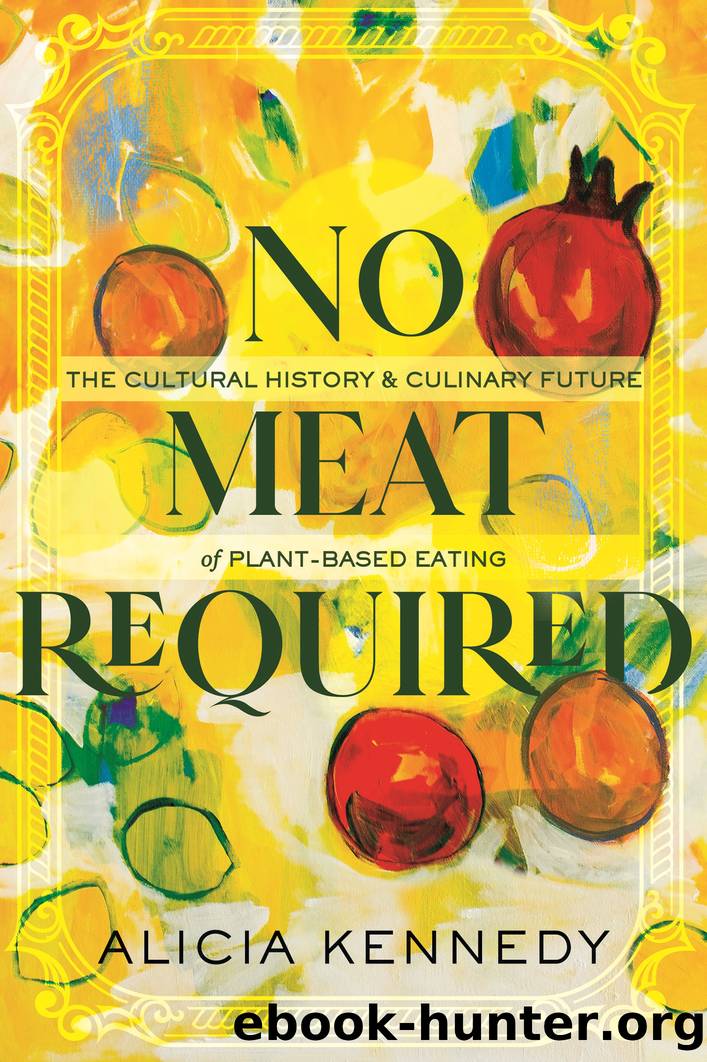No Meat Required by Alicia Kennedy

Author:Alicia Kennedy [Kennedy, Alicia]
Language: eng
Format: epub
Publisher: Beacon Press
Published: 2023-08-15T00:00:00+00:00
6.
MEATLESS PLURALITY
Not eating meat, whether as a vegetarian, vegan, or plant-based flexitarian, does not come with a standard food-justice playbook. As Iâve been writing, in the United States, these approaches to food have been popularized in the imagination and immortalized in the famous cookbooks by mainly white folks of the baby boomer generation, and that has left its political perspective and justice orientation adrift. Theyâre open to interpretation and there is no pledge of allegiance, meaning there have been troubling strains of thought allowed to fester under the umbrella of animal welfare and perhaps not enough focus on broader, more community- and policy-oriented approaches to food justice and access.
There are even conservative vegans. In the United Kingdom, they have their own caucus in the Conservative Party. In the United States, Matthew Scully has been the most vocal conservative proponent of animal rights. His 2002 book, Dominion: The Power of Man, the Suffering of Animals, and the Call to Mercy, argues for an end to factory farming and hunting, stating that animals are worthy of human care and concern because of their powerlessness. A speechwriter for various politicians in both the Democrat and Republican parties, including former president George W. Bush, he is the kind of conservative who called themselves pro-life while supporting the war in Iraq, which killed an estimated two hundred thousand civilians.1 A New York Times âVowsâ column in 2018 told of the meeting of two conservative vegan lawyers.2
While they go against the common understanding of meat being a non-negotiable tenet of right-wing ideology, conservative veganism makes a sort of sense philosophically to the practitioners: to them, animals are sentient and sacred, and so is the conservation of the environment of which animals are a part. If it strikes one as sensible that care for animals and the environment should also extend to vulnerable people and a deeply cruel and discriminatory carceral system, I agree.
But there is an even uglier strain of right-wing veganism thatâs called âecofascism.â Those who subscribe to this way of thinking argue that climate change will result in resource scarcity, and they thus must prioritize the well-being of their own peopleânamely, white people who claim the Global North as home. For the ecofascists, this means turning away migrants from the Global South who are already suffering the effects of a warming planet.
As Sarah Manavis wrote in 2018 for the New Statesman while examining the phenomenon of ecofascism and its connection to white supremacy and veganism, âMany eco-fascists are also eugenicists who believe that a culling of the population, and specific races within that population, is the only way to ensure that the planet survives. While not all eco-fascists go as far as supporting mass murder, most hold that immigration has caused overpopulation in their countries and insists that the only solution is to deport those they deem non-indigenous.â3
Ecofascism thinking is underpinned by the work of Thomas Robert Malthus, an English economist born in 1766 who believed that population growth would always outrun the global food supply and that limits on reproduction were a necessary condition of âhuman betterment.
Download
This site does not store any files on its server. We only index and link to content provided by other sites. Please contact the content providers to delete copyright contents if any and email us, we'll remove relevant links or contents immediately.
Craft Beer for the Homebrewer by Michael Agnew(18218)
Marijuana Grower's Handbook by Ed Rosenthal(3659)
Barkskins by Annie Proulx(3346)
Project Animal Farm: An Accidental Journey into the Secret World of Farming and the Truth About Our Food by Sonia Faruqi(3206)
The Plant Messiah by Carlos Magdalena(2911)
Red Famine: Stalin's War on Ukraine by Anne Applebaum(2908)
0041152001443424520 .pdf by Unknown(2832)
Organic Mushroom Farming and Mycoremediation by Tradd Cotter(2672)
In the Woods by Tana French(2575)
Beer is proof God loves us by Charles W. Bamforth(2434)
7-14 Days by Noah Waters(2398)
Borders by unknow(2292)
Reservoir 13 by Jon McGregor(2282)
Between Two Fires by Christopher Buehlman(2281)
Meathooked by Marta Zaraska(2250)
The Art of Making Gelato by Morgan Morano(2243)
Birds, Beasts and Relatives by Gerald Durrell(2202)
The 7 Habits of Highly Effective People: Powerful Lessons in Personal Change (25th Anniversary Edition) by Covey Stephen R(2178)
The Lean Farm Guide to Growing Vegetables: More In-Depth Lean Techniques for Efficient Organic Production by Ben Hartman(2122)
